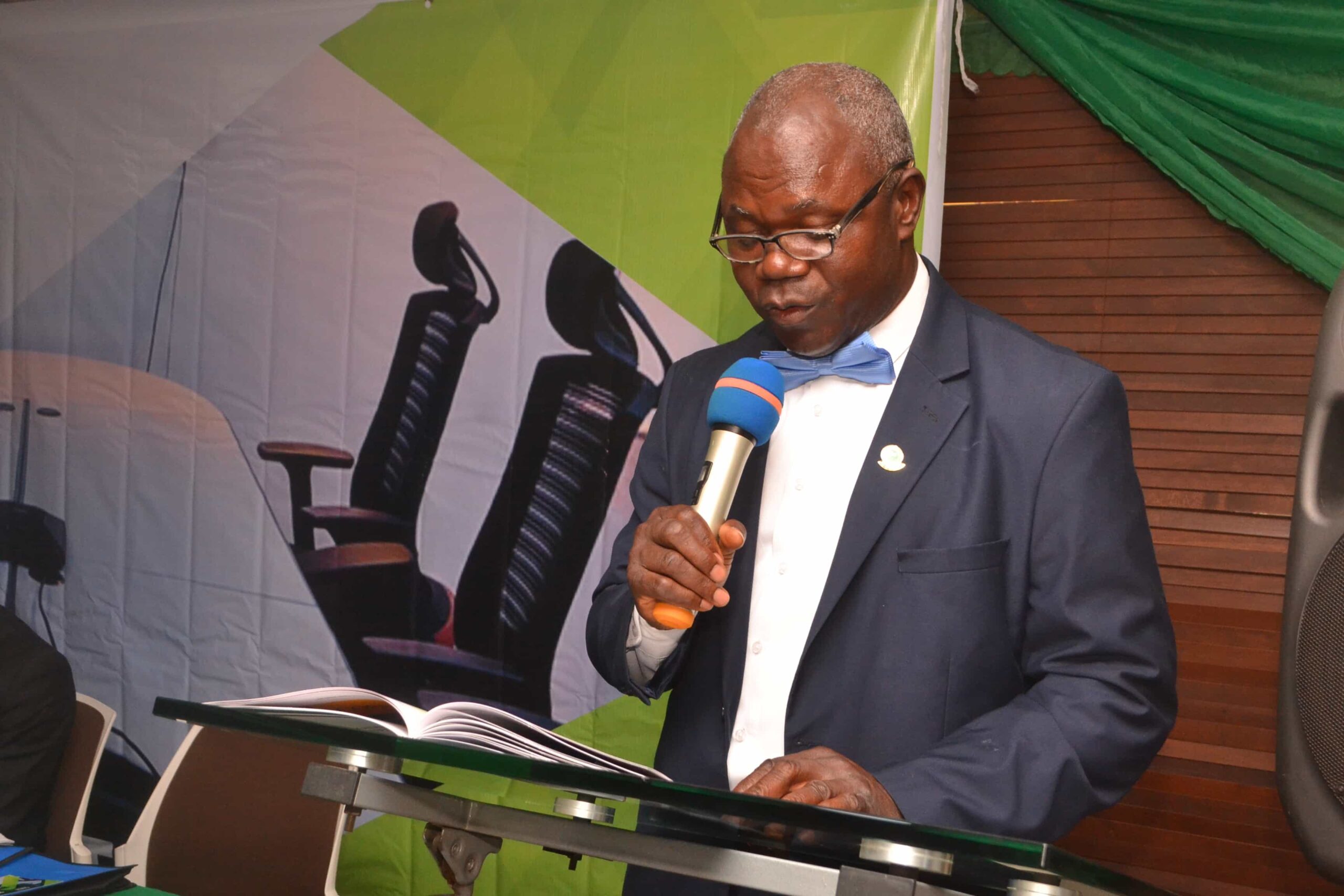Protocols.
Thank God for divine protection and guidance.
Thank God for the opportunity to belong to the Town Planning Profession.
Justice P. C. Onumajulu holds that God created man to sustain His creation and particularly to plan and sustain the environment created by Him. Thus, town planning’s origin was designed and directed by God to replicate what He has commenced, namely, creation of order in human environment. The essence of town planning therefore is to strive towards restoration of human environment to its original status.
I am particularly enthused by the theme of discussion in this workshop being “Professional Services and Practice: the Ethical Dilemma”. I thank God for the leadership of ATOPCON for choosing it. Comparing it with the theme of our Mandatory Continuing Professional Development Programme (MCPDP) this year, I see a convergence and a new awakening. It gives me an impression that we are coming to terms with the challenges facing the image of professionals and the practice of this profession. If I call it a turn-around movement or an ethical revolution, I may not be far from the truth because it is evident that a new dawn will be hatched in no distant future. I say this because practice without ethical principles is like dancing to a discordant music; there can be no melody or harmony. Having ethical principles without compliance is comparable to driving a vehicle without obeying traffic regulations. The profession and the practitioner as well as the clients or beneficiaries of the end-product will all operate with dangerous risks. But thank God, we are tracking our steps and tracing them to the missing links to ensure that we do not continually gravitate towards oblivion nor leave the next generation in confusion through neglect of ethical values and its enforcement.
Ethics form the bridge that connects the professional to the public. The way and manner the professional carries out his jobs and assignments in consideration of the ethics projects the image of the profession to the public. The way the public sees the compliance of the professional is the point of marketing for the profession. At the point of compliance with ethical values, the profession can either be hailed as the Messiah to environmental problems or be crucified as detractors to environmental aspirations. This is why we seem to lament and groan that ethical values are presently at cross roads. But I do hope that through our frank discussions here during this workshop, we shall move from groaning to growing in ethical knowledge and compliance; and thereby lift high the banner of the profession.
Let me however, make a little attempt to briefly describe ethics to make myself clear on pertinent issues. Ethics is often defined as “that branch of philosophy dealing with values relating to human conduct, with respect to the rightness and wrongness of certain actions and to the goodness and badness of the motives and ends of such actions.” The word originated from the Greek word, “ethos,” which is defined as “the fundamental character or spirit of a culture; the underlying sentiment that informs the beliefs, customs, or practices of a group or society; dominant assumptions of a people or period.” In the professional or business context it isn’t always helpful to see “ethics” as synonymous with “morality” or “goodness.” It is rather more instructive to look at it as a means to an end: “the values relating to human conduct.”Simply put, ethics involve learning what is right or wrong, and then doing the right thing.
The essence of Ethics and Code of Professional Conduct is to set out the required standards of professional conduct and practice expected of members. Its purpose is to protect and guide practitioners, and to serve as a tool to maintain public trust in the profession. All members, irrespective of their class of membership, are required to adhere to the vision, mission, aim, objectives and core values of the Institute which among others include: professionalism with integrity, networking and capacity building, effective cooperation and collaboration, pro-activeness and pragmatism. This should be adequately complimented by competence, honesty, independent professional judgment, due care, diligence, equality, respect, risk-taking, persistence, customer focus and professional behavior.
It could be painfully observed that many of the golden ethical values enumerated above have been undermined or at least treated with levity and even in some instances with reckless abandon. The reasons for this too may not be far-fetched. They are attributable to inadequate instruction of students while undergoing training and poor mentoring in morality and practice. Where training institutions keep educators who though registered as professionals do not participate in the activities of the professional body, their quality of knowledge and instruction would naturally be insufficient to produce the quality of practitioner we need. At the same time, upon graduation, they are not properly mentored before they are licensed by the Town Planners’ Registration Council of Nigeria (TOPREC). The candidates sit for examinations which are not too different from what they were taught while at school which already had accreditation. These form the bane of our ethical dilemma in practice.
Before I conclude, permit me to make the following suggestions as strategies towards ameliorating some of the challenges we are facing in ethical compliance.
- Grow membership that appreciates the purpose of the town planning profession for according to Myles Munroe “when the purpose of a thing is not known, abuse is inevitable”.
- Students must attend the mandatory internship programme of Students’ Industrial Work Experience (SIWES) while at school; and must be done under competent trainers.
- Planning educators or Planners in academics should give sufficient time to their students to teach them well. The practice of sending lecture notes (Handouts) to students without appearing to lecture as at when due is a form of malpractice which should attract appropriate sanctions. This is because the peculiarity of teaching planning is more by impartation than telling its stories.
- Lecturers should regularly attend the programmes the professional body to keep abreast with current challenges and best practices. Internship of Planning educators should be re-enacted and enforced to the extent that each lecturer must attend internship programme of not less than three months during vacation at least once in five years.
- Government and even private developers must engage consultants in preparing their development plans. There should be a clear separation of duties between practitioners in public service and those in private practice.
- TOPREC needs to review the format for admitting planners into the professional cadre. Examinations must be more on the knowledge and practice of ethics rather than academic materials.
- Erring practitioners must be brought to book, unlike the present practice. Both NITP and TOPREC have not really sanctioned members who have violated ethical values either due to negligence, sentiments or naivety. The Committee on Professional Ethics and Discipline has been the most idle committee of the Institute. This must stop. We can no longer condone the syndrome of barking without biting. Erring members must be put under the required discipline to serve as deterrents to others.
- As for NITP, we shall endeavor to collaborate with relevant agencies of government to accord the profession the requisite recognition, appropriate designation and relevant salary scales as it is being done for other professional groups in the built environment.
In conclusion, let me re-emphasize that the knowledge and compliance with ethical standards is the currency for shopping in the image market. Adherence to code of conduct will make any professional to stand out. It is the trumpet that announces essence of our being. Without it, practice has neither value nor direction.
Professional colleagues, ladies and gentlemen, may our deliberations here today bring a new understanding to our appreciation of ethical values and revolution to our compliance.
I thank you all for listening.
Long live the NITP, TOPREC and ATOPCON.
Long live the Federal Republic of Nigeria.
Blessings.


